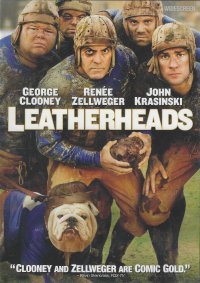 You might remember hearing about this George Clooney football movie. I am not sure how many people saw it. When you come right down to it, you could say that about a lot of George Clooney movies: You’ve heard of it, but you’ve not seen it. He made some interesting selections at the peak of his movie bankability: Oh Brother, Where Art Thou?, The Men Who Stare At Goats, Syriana, Solaris–sometime after 2000, he decided his name alone could bring people in, and I guess it did, but not many. Although, to be honest, I guess I have seen a number of those in the theater, so perhaps I am speaking here without data to back it up (a blogger, abstracting incorrectly? Heaven forfend!).
You might remember hearing about this George Clooney football movie. I am not sure how many people saw it. When you come right down to it, you could say that about a lot of George Clooney movies: You’ve heard of it, but you’ve not seen it. He made some interesting selections at the peak of his movie bankability: Oh Brother, Where Art Thou?, The Men Who Stare At Goats, Syriana, Solaris–sometime after 2000, he decided his name alone could bring people in, and I guess it did, but not many. Although, to be honest, I guess I have seen a number of those in the theater, so perhaps I am speaking here without data to back it up (a blogger, abstracting incorrectly? Heaven forfend!).
At any rate, it’s probably best to not think of this as a football movie or a football comedy but more around the drama of the logistics of having a professional football team in the early part of the 20th century. Clooney plays Dodge, a player/coach for a fictional Duluth professional football team struggling to remain solvent as they barnstorm the Midwest to play other teams in similar situations. When the team goes under, Dodge convinces a college star and recently returned World War I hero (Carter Rutherford, played by John Krasinski) to play for his team to draw people into the stands–even though the team doesn’t really exist. As they start attracting crowds, a female reporter played by Renée Zellweger is investigating whether Carter’s war exploits were oversold.
So the focus is not on the playing of the football but rather the off-field antics as Dodge woos Lexie, the reporter, and tries to keep the plates of running the football team spinning.
So although it’s a comedy, like The Men Who Stare At Goats and Oh Brother, Where Art Thou? (I admit twice I added the appropriate second comma to that title, but that would be [sic]), it’s amusing in spots at best and that’s about it. Perhaps Clooney would indicate it’s too sophisticated for me. Perhaps he would be correct.
The war story, though, I recognize that as based on Sergeant York’s story, which was believed initially and then doubted for a time as more skeptical generations arose but has more recently been sort of verified. Although Carter’s story of his battle differs–he awakens from a drunken stupor to find he’s behind a German advance and captures a bunch of them from there–one can see the influence. I guess I’m not sophisticated enough to celebrate tearing down icons, even fictional ones. (As a reminder, I watched Sergeant York with Gary Cooper in 2020 and read Sergeant York: His Own Life Story and War Diary last year).
At any rate, I don’t know if I will rewatch this DVD, but I can if I want. Which is unlike football comedies like Necessary Roughness and The Waterboy which are more comedic and more focused on the football qua football.
As a closing thought, I have to wonder if George Clooney got the sense that he was a modern Cary Grant–I know some press compared him to the black-and-white star back in the day. But Grant’s comedies, such as His Girl Friday and even The Bachelor and the Bobby-Soxer, are funny. Or maybe just funny to people steeped in the tropes of black-and-white. Who can laugh at the jokes at Shakespeare and Jonson without reading the footnotes first. By whom, I probably mean me. And, for the record, I have never considered going Clooney.


